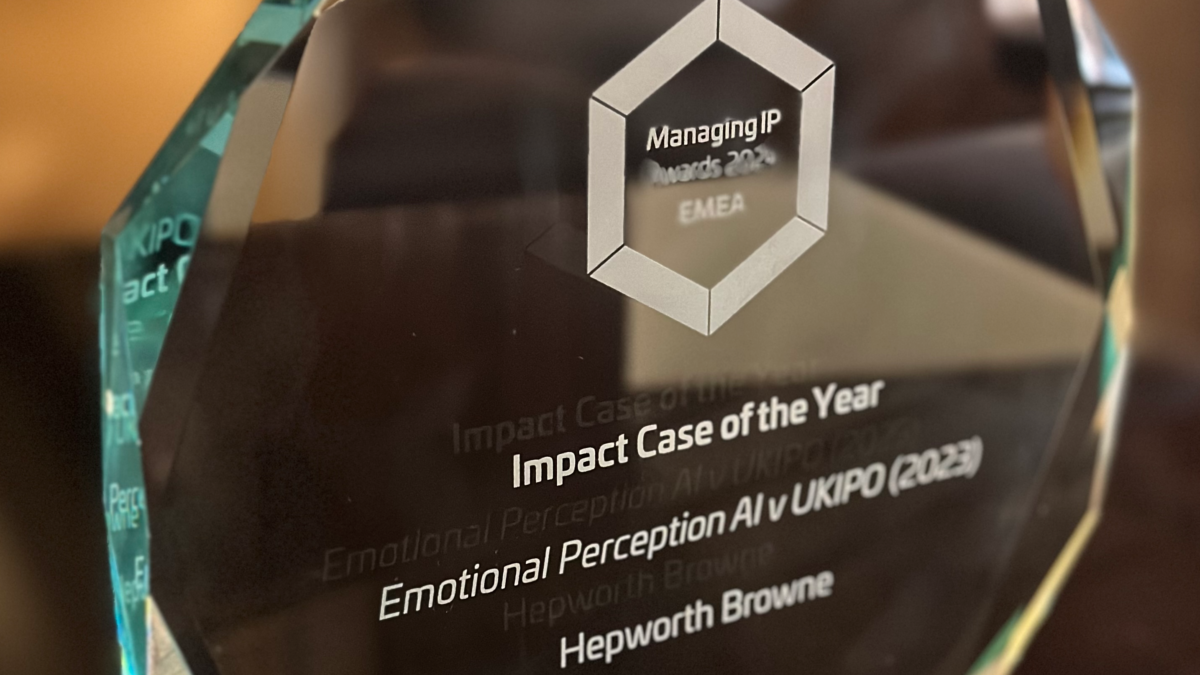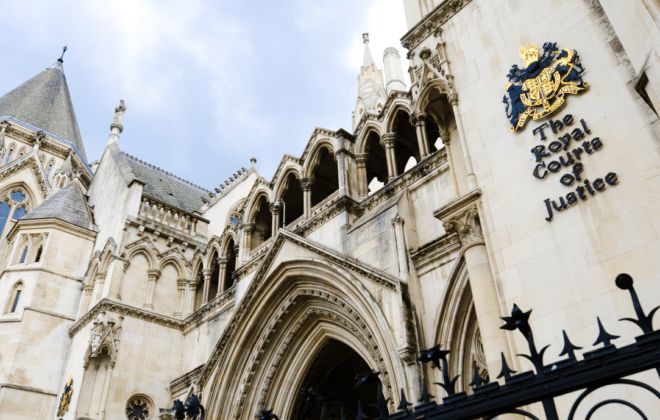Hepworth Browne Recognised at Managing IP EMEA Awards For “Impact Case of The Year”
Hepworth Browne is delighted to announce that its groundbreaking work on the exclusions to patentability of section 1(2) UK Patents Act “UKPA”, in the Emotional Perception AI vs Comptroller General of Patents decision [2023] EWHC 2948 (Ch), has received the prestigious 2023 “Impact Case of the Year” award from Managing IP.
The work and court decision bring into sharp focus the patentability of artificial neural networks “ANNs” and their core involvement in AI technologies, significantly what amounts to a computer program, and most importantly what amounts to a technical contribution sufficient to overcome statutory exclusion.
Since the High Court decision on 21 November 2023, there have been around 200 national UK and international articles written on the legal significance of this case to the computing and AI industries, including recent articles in GRUR in Germany. These articles overwhelming welcome the decision. Reflecting further the significance of the decision, the UKIPO immediately modified its examination guidelines on the treatment of ANNs. The Emotional Perception case will positively assist industries by providing clarification on at least the “as such” computer program limitation under the UKPA.
Bruce Dearling, the partner at HB who led the case and instructed Mark Chacksfield KC and Henry Edwards of 8 New Square, commented:
“This award from MIP reflects several years of preparatory work, chipping away at the case law and thought, including an understanding at the outset that Emotional Perception’s invention would likely be initially rejected by the UKIPO for reasons of statutory exclusion. Good cases make good case law, with this case falling into that rarified breed. Emotional Perception and its parent company, Time Machine Capital, understood this from the beginning, had faith in both our highly reasoned predictions and the longer-term strategy, and further understood how the projected change in law would positively underpin its longer-term commercial success and investability. With the aid of Mark and Henry, the team has challenged the status quo by objectively exposing the perceived deficiencies and frailties in the UKIPO’s arguments against protecting new AI technologies, and we have continued to dismantle the UKIPO’s and EPO’s approaches and case law to present the CoA with cogent and compelling arguments on what the underlying intent of the legislator must reasonably have been, and on how the limitations to patentability should work especially in the context of what amounts to the up- to-now generally undefined term “technical contribution.” We remain steadfast in our considered opinion that our approach in this area of law is fundamental, generationally important, and more likely correct than not irrespective of whether Emotional Perception’s invention is assessed under computer program, business method, the presentation of information and/or the mathematical method exclusions of UK and EPO law. We therefore look forward to the upcoming CoA hearing and the chance to settle and clarify a major part of international patent law. We also thank Managing IP for recognising that this case was important and worthy of the awarded accolade.”
It would be remiss not to acknowledge that the UKIPO has appealed this decision and that the UK Court of Appeal will hear this appeal on 14 and 15 May 2024. The UKIPO’s expedited appeal raises new grounds against patentability by alleging that the invention is also excluded under mathematical method exclusions, with this approach presently favoured by the EPO in its current assessment of ANN technology. Any decision from the CoA is likely to be even more significant regardless of the outcome, and a further appeal to the UK Supreme Court cannot be ruled out because of the impact of the legal arguments advanced by Hepworth Browne on how technical contribution must be assessed both in the UK and under the European Patent Convention “EPC” in Emotional Perception’s co-pending European patent application (should it be refused). A conflicting approach between the CoA and the case law of the Technical Board of Appeal could potentially cause a referral to the EPO’s Enlarged Board of Appeal. Hepworth Browne is a boutique firm of nationally and internationally qualified patent and trade mark attorneys with expertise in many technical areas, including telecommunication, computing, engineering, and chemistry.
It would be remiss not to acknowledge that the UKIPO has appealed this decision and that the UK Court of Appeal will hear this appeal on 14 and 15 May 2024. The UKIPO’s expedited appeal raises new grounds against patentability by alleging that the invention is also excluded under mathematical method exclusions, with this approach presently favoured by the EPO in its current assessment of ANN technology. Any decision from the CoA is likely to be even more significant regardless of the outcome, and a further appeal to the UK Supreme Court cannot be ruled out because of the impact of the legal arguments advanced by Hepworth Browne on how technical contribution must be assessed both in the UK and under the European Patent Convention “EPC” in Emotional Perception’s co-pending European patent application (should it be refused). A conflicting approach between the CoA and the case law of the Technical Board of Appeal could potentially cause a referral to the EPO’s Enlarged Board of Appeal. Hepworth Browne is a boutique firm of nationally and internationally qualified patent and trade mark attorneys with expertise in many technical areas, including telecommunication, computing, engineering, and chemistry.
Related Posts
Leave a Reply Cancel reply




